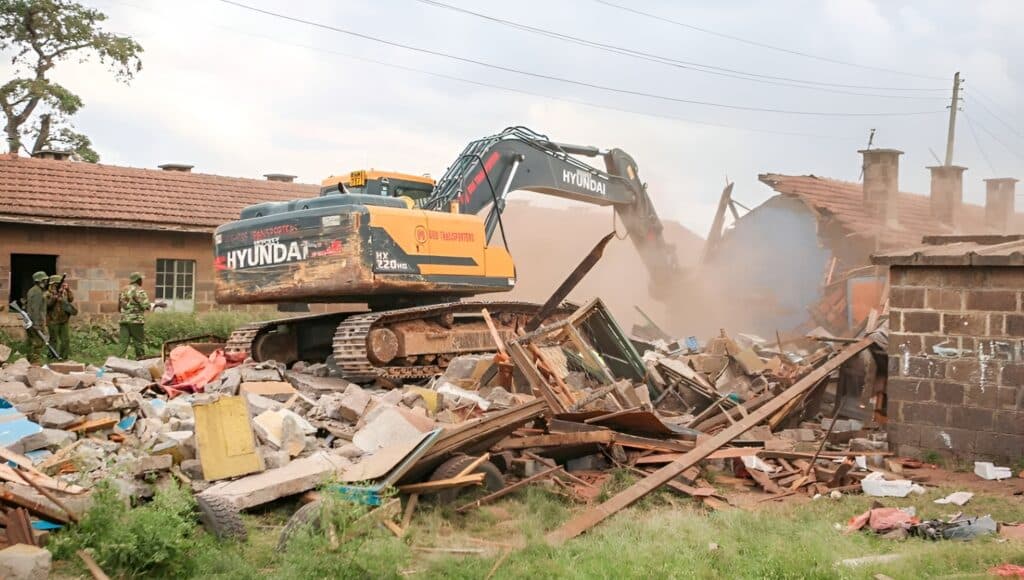We're loading the full news article for you. This includes the article content, images, author information, and related articles.
The Environment and Land Court has issued a temporary reprieve for thousands of Makongeni Estate residents, suspending demolitions linked to the government's affordable housing project and raising critical questions about the legality and humanity of the process.

NAIROBI, KENYA – The High Court of Kenya's Environment and Land Court has issued urgent conservatory orders halting the ongoing evictions and demolitions in Nairobi's historic Makongeni Estate. In a ruling delivered on Monday, November 24, 2025, Justice Charles Mbogo certified the matter as urgent, providing temporary relief to hundreds of families facing displacement to pave the way for a large-scale affordable housing project.
The court's intervention follows an urgent application filed by the Makongeni Residents Association and several individual petitioners. They accuse the respondents—the Kenya Railways Staff Retirement Benefits Scheme (KRSRBS), the State Department for Housing and Urban Development, and the Affordable Housing Board—of orchestrating a forceful and unlawful eviction process. The judge's order explicitly bars the respondents, or any person acting on their instructions, from continuing with demolitions or any form of displacement within the estate pending an inter-partes hearing scheduled for December 4, 2025.
Crucially, Justice Mbogo also directed the immediate reconnection of water and electricity services, which residents claim were unlawfully disconnected to coerce them into vacating their homes. Petitioners alleged that hired personnel and officers entered the estate, particularly after the court declined to issue initial orders on November 20, and engaged in acts of intimidation, including assault and harassment, to force residents out in a manner described as “inhumane, inconsiderate, and degrading.”
The legal challenge is grounded in alleged violations of fundamental constitutional rights. The petitioners, represented by lawyers including Brian Riang'a, argue that the evictions contravene Article 43 of the Constitution, which guarantees the right to accessible and adequate housing, and Article 28, which protects the inherent dignity of every individual. They contend that the process lacked meaningful public participation and that consent for the demolitions was obtained through opaque and coercive means, with some illiterate residents allegedly signing documents without understanding their implications.
The land in question is legally owned by the Kenya Railways Staff Retirement Benefit Scheme, which holds it under a concession from the Kenya Railways Corporation. The estate, built in the 1940s for railway workers, is home to a multi-generational community of up to 40,000 people, many of whom are descendants of the original tenants. The government's plan involves redeveloping the 139-acre property into a modern, high-density hub with residential, commercial, and recreational facilities as part of President William Ruto's national Affordable Housing Programme.
A key point of contention is the compensation offered to residents. The government has been providing a relocation facilitation fee of KSh 150,000 to verified households. However, residents and civil society groups, including the Law Society of Kenya (LSK), argue this amount is grossly insufficient to secure comparable alternative housing in Nairobi's inflated rental market. The LSK, which had threatened legal action, stated that while some residents received the payment, the majority had not, rendering the eviction notices effectively invalid. The petitioners also argue that the three-month eviction notice was unreasonably short.
Makadara Member of Parliament, George Aladwa, has publicly supported the government's position, urging residents who received the facilitation fee to vacate and allow the development to proceed. The government maintains that the relocation process has been consultative and people-centered, involving extensive enumeration and verification to identify rightful beneficiaries. Officials have also assured that current residents will be given priority to purchase the new housing units once construction is complete.
The Makongeni case highlights the persistent tension between national development agendas and the constitutional rights of citizens, particularly concerning land and housing. It echoes previous legal battles over forced evictions in informal settlements and raises critical questions about the implementation of the Affordable Housing Programme, which itself faces separate legal challenges over its funding mechanism, the housing levy. A final ruling in favor of the Makongeni residents could set a significant legal precedent, reinforcing the state's obligation to ensure dignified relocation, adequate compensation, and robust public participation in similar development projects across Kenya. The case proceeds as the nation watches, balancing the urgent need for urban renewal with the fundamental right to secure and adequate housing for all its citizens.
Keep the conversation in one place—threads here stay linked to the story and in the forums.
Sign in to start a discussion
Start a conversation about this story and keep it linked here.
Other hot threads
E-sports and Gaming Community in Kenya
Active 9 months ago
The Role of Technology in Modern Agriculture (AgriTech)
Active 9 months ago
Popular Recreational Activities Across Counties
Active 9 months ago
Investing in Youth Sports Development Programs
Active 9 months ago
Key figures and persons of interest featured in this article